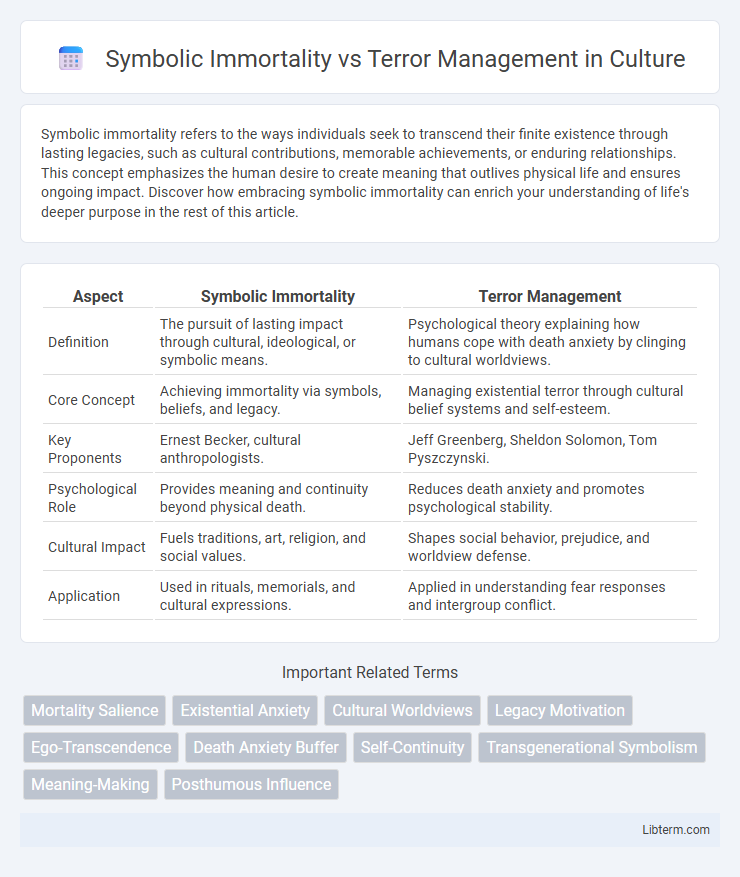Symbolic immortality refers to the ways individuals seek to transcend their finite existence through lasting legacies, such as cultural contributions, memorable achievements, or enduring relationships. This concept emphasizes the human desire to create meaning that outlives physical life and ensures ongoing impact. Discover how embracing symbolic immortality can enrich your understanding of life's deeper purpose in the rest of this article.
Table of Comparison
| Aspect | Symbolic Immortality | Terror Management |
|---|---|---|
| Definition | The pursuit of lasting impact through cultural, ideological, or symbolic means. | Psychological theory explaining how humans cope with death anxiety by clinging to cultural worldviews. |
| Core Concept | Achieving immortality via symbols, beliefs, and legacy. | Managing existential terror through cultural belief systems and self-esteem. |
| Key Proponents | Ernest Becker, cultural anthropologists. | Jeff Greenberg, Sheldon Solomon, Tom Pyszczynski. |
| Psychological Role | Provides meaning and continuity beyond physical death. | Reduces death anxiety and promotes psychological stability. |
| Cultural Impact | Fuels traditions, art, religion, and social values. | Shapes social behavior, prejudice, and worldview defense. |
| Application | Used in rituals, memorials, and cultural expressions. | Applied in understanding fear responses and intergroup conflict. |
Introduction to Symbolic Immortality and Terror Management
Symbolic immortality refers to the psychological mechanism by which individuals seek to transcend death through cultural, spiritual, or ideological legacies that provide a sense of enduring significance. Terror Management Theory explores how awareness of mortality induces existential anxiety, prompting people to cling to their symbolic immortality constructs to maintain self-esteem and worldview stability. Both concepts underscore the human drive to mitigate death-related fear by investing in meanings that outlast individual life.
The Psychology Behind Fear of Death
The psychology behind fear of death reveals how symbolic immortality provides a mental shield by creating enduring legacies that transcend mortal existence, mitigating existential anxiety. Terror Management Theory explains this fear as rooted in the conflict between self-preservation instincts and the awareness of inevitable mortality, triggering defense mechanisms like cultural worldview adherence. Understanding these intertwined concepts highlights how humans cope with death anxiety through symbolic meaning, cultural validation, and psychological defenses.
Defining Symbolic Immortality: Meaning and Mechanisms
Symbolic immortality refers to the psychological concept where individuals achieve a sense of enduring significance through cultural, social, or symbolic means, such as legacy, beliefs, or creative works. Mechanisms of symbolic immortality include cultural worldviews, social identities, and personal achievements that help people transcend physical mortality by providing lasting meaning and value beyond their lifespan. This concept contrasts with Terror Management Theory, which posits that awareness of death triggers existential anxiety managed by embracing symbolic immortality to uphold self-esteem and cultural meaning.
Core Principles of Terror Management Theory
Terror Management Theory (TMT) centers on the psychological mechanisms people use to cope with the awareness of mortality, asserting that cultural worldviews and self-esteem provide symbolic immortality by offering meaning and permanence beyond physical death. Core principles of TMT highlight that individuals manage existential terror by striving to maintain faith in their cultural beliefs and by seeking validation of their value within these frameworks. This theory explains that threats to worldviews increase existential anxiety, motivating defensive behaviors to restore a sense of symbolic immortality and psychological equanimity.
Symbolic Immortality in Culture and Society
Symbolic immortality in culture and society manifests through enduring legacies, such as art, religion, and collective memory, which offer individuals a sense of transcendence beyond physical death. Cultural narratives and rituals perpetuate values and identities, fostering continuity across generations and reinforcing social cohesion. This concept helps individuals cope with mortality by embedding personal meaning within broader, lasting cultural frameworks.
How Terror Management Influences Human Behavior
Terror management theory explains how awareness of mortality drives individuals to uphold cultural worldviews and self-esteem as defenses against existential anxiety. This psychological mechanism influences behavior by promoting in-group loyalty, out-group hostility, and efforts to achieve symbolic immortality through lasting achievements or beliefs. These defense strategies help mitigate death-related fear, shaping social attitudes, decision-making, and interpersonal relationships.
Comparing Belief Systems: Religion, Legacy, and Beyond
Symbolic immortality manifests through diverse belief systems such as religion, cultural legacy, and personal achievements, each offering unique pathways to transcend mortality. Terror Management Theory (TMT) explores how these systems function to alleviate death anxiety by providing meaning and continuity beyond physical existence. Comparative analysis reveals religion emphasizes supernatural permanence, legacy centers on tangible social impact, and emerging secular ideologies expand symbolic immortality through technological and environmental contributions.
Coping Strategies: From Immortality Projects to Worldview Defense
Symbolic immortality involves coping strategies where individuals pursue lasting legacies through cultural achievements, creativity, or social contributions to transcend mortality anxiety. Terror management theory explains how worldview defense mechanisms are activated to protect self-esteem and social identity when confronted with death reminders. These divergent yet complementary processes highlight how symbolic immortality projects and strong adherence to cultural worldviews function as essential buffers against existential terror.
Impacts on Mental Health and Well-being
Symbolic immortality, which involves creating lasting legacies through culture, relationships, or achievements, provides individuals with a sense of meaning that mitigates existential anxiety and enhances mental well-being. Terror Management Theory explains how awareness of mortality triggers defense mechanisms that influence self-esteem and group identity, often leading to stress but also promoting psychological resilience. Both concepts significantly shape coping strategies and affect outcomes related to anxiety, depression, and overall psychological health.
Navigating Mortality: Toward Reconciliation and Acceptance
Symbolic immortality and terror management theories explore how individuals cope with the awareness of mortality by affirming cultural beliefs, values, and meaningful pursuits to create a sense of enduring legacy. Navigating mortality involves fostering reconciliation between existential fears and acceptance through mindfulness, existential therapy, and embracing interconnectedness, which reduce death anxiety and promote psychological well-being. Integrating symbolic immortality with terror management strategies supports a balanced perspective that validates mortality's inevitability while encouraging purposeful living and existential growth.
Symbolic Immortality Infographic

 libterm.com
libterm.com